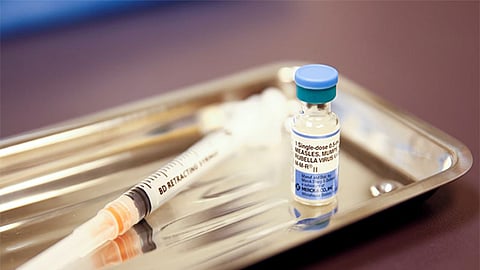

NEW DELHI: More than two million infants remain completely unvaccinated in the Southeast Asia region, and approximately 6.5 lakh do not receive all the recommended vaccines, the WHO said on April 25.
On the occasion of World Immunisation Week, the World Health Organisation (WHO) said in 59 years, vaccines have saved at least 154 million lives.
“What started in 1974 as the Expanded Programme on Immunization focused on six childhood illnesses and has today evolved to thirteen universally recommended vaccines across the life course. In these 50 years, vaccines have saved at least 154 million lives – a remarkable 6 lives saved each minute, every day, for five decades,” Saima Wazed, Regional Director for WHO South-East Asia Region, said.
“More children now live to see their first birthday than at any other time in human history, and the measles vaccine alone accounts for 60 per cent of those lives saved. Immunisation campaigns have enabled us to eradicate smallpox, eliminate polio in our South-East Asia Region, and bring neonatal and maternal tetanus down to extremely low levels,” she added.
It is clear that vaccines are, undoubtedly, one of humanity’s greatest achievements, she stressed.
She said in the region, which includes India, over forty million pregnant women and thirty-seven million newborns are vaccinated annually.
“We are also a global leader in vaccine production, with 46 per cent of the world's supply. These achievements are significant, but we have much more to do. More than two million infants remain completely unvaccinated in our region, and approximately 650,000 do not receive all the recommended vaccines. Covid-19 also saw progress on immunisation stall, resulting in the need for continued catch-up vaccination today. This is evident in the diphtheria and measles outbreaks that have unfortunately started occurring,” she said.
Highlighting that the recent changes in donor budgets in global health has put a severe strain on immunisation programmes everywhere, and have also affected disease surveillance, laboratory networks and outbreak response capacities, she said the confluence of these could lead to tragic outcomes.
“..We urge national governments to boost their EPI investments to ensure the long-term sustainability of immunisation,” she said.
“We are at a crossroads. The hard-won gains in stamping out vaccine-preventable diseases are in jeopardy. We must choose the path of collaborative action, towards hope and health. In walking this path, we must strengthen health systems, address vaccine hesitancy, enhance surveillance, and ensure sustainable financing,” she added.
“The only way forward is together -- governments, health organisations, communities, and individuals -- to protect all the progress we've made, and continue toward a world where no one suffers from a disease that could have been prevented by vaccination,” she said.
On World Immunisation Week, she appealed to them to join in spreading the message that vaccines are safe, vaccines save lives, and immunization for all is essential.
“To do this would be to protect humanity’s greatest achievement -- vaccines -- and protect humanity’s greatest treasure -- our children,” she added.
World Immunization Week, marked annually in the last week of April, promotes the use of vaccines to protect people of all ages against disease.
The goal of World Immunisation Week is for more people -- and their communities -- to be protected from vaccine-preventable diseases and the theme this year is “Immunisation for all is humanly possible.”